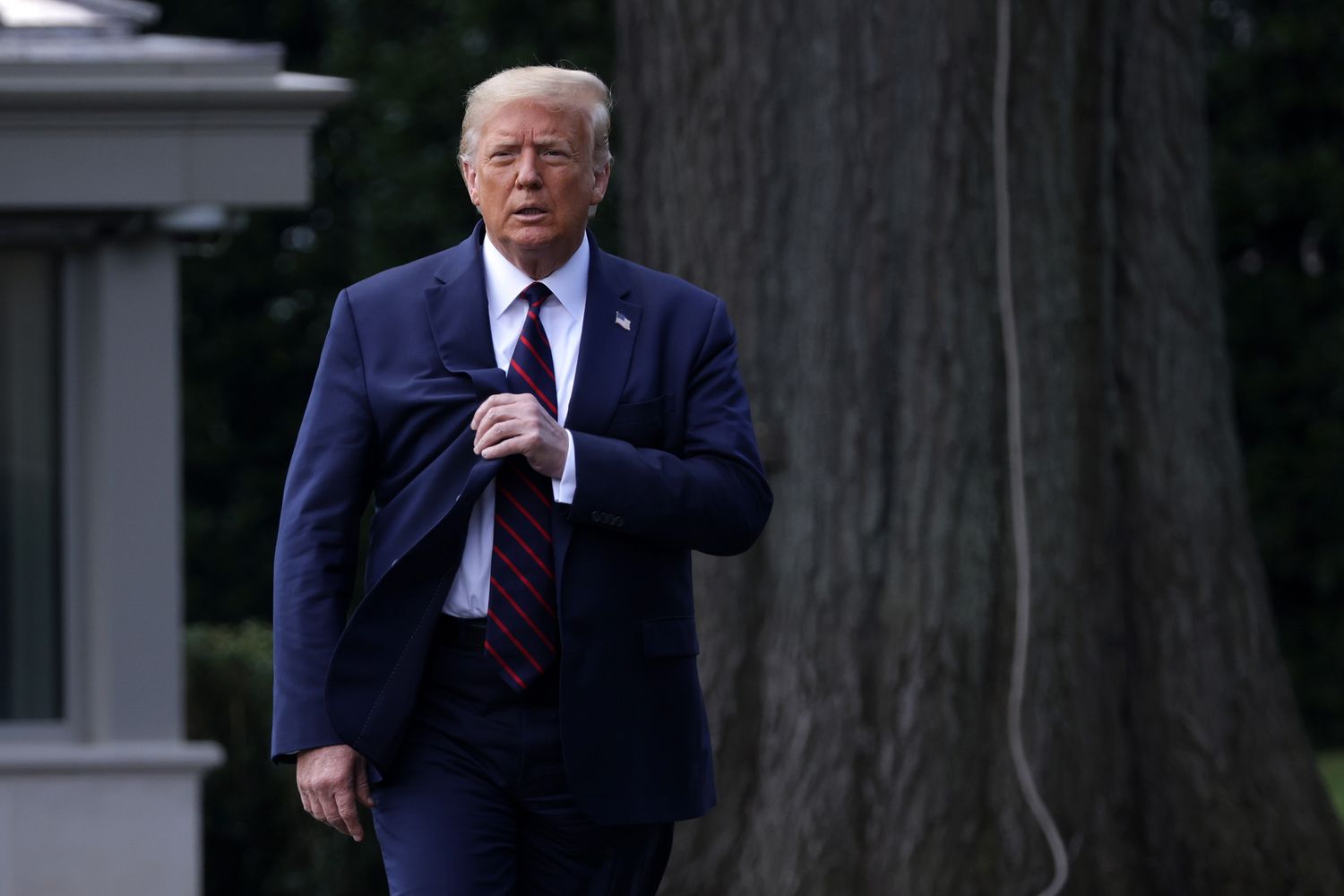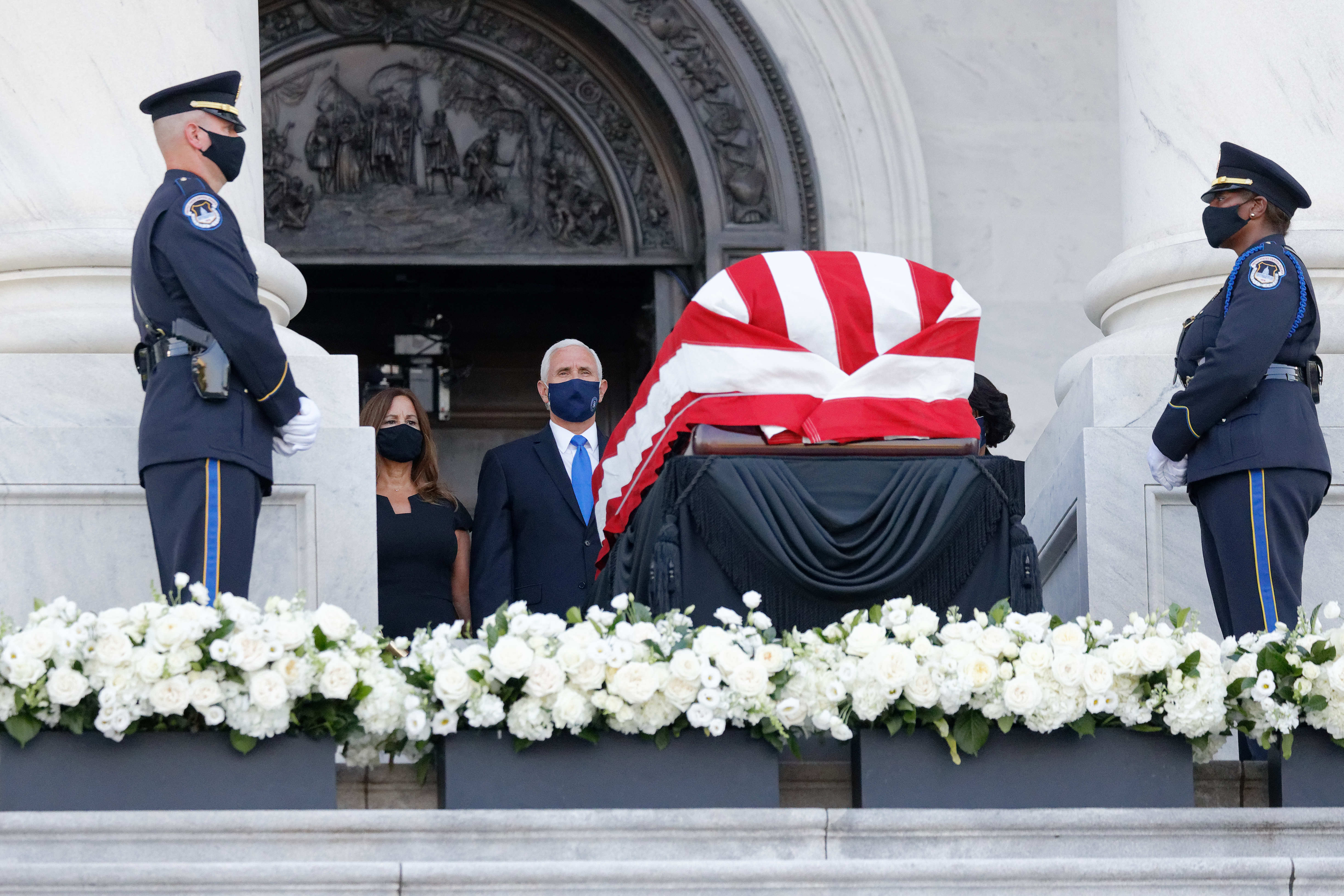
When John Lewis, the civil rights icon and longtime Democratic congressman from Georgia, died at the age of 80 a little over a week ago, President Donald Trump publicly ignored his passing for about 12 hours.
As the news broke late on a Friday and remembrances poured in, the president was blasting out nearly four dozen tweets and retweets about various other topics, from his niece’s scathing new book to former Vice President Joe Biden.
Trump’s muted reaction to the death of a historic figure — albeit one with whom he disagreed — is just the latest instance of how he struggles to respond as a typical president would in these situations, an issue that critics have pounced on in recent months as coronavirus deaths continue to pile up with only passing mentions from Trump.
It’s also an illustration of the strikingly different ways Trump has treated the passing of iconic figures, a contrast that was brought into stark relief by how he reacted to the death of a beloved TV personality on Saturday.
“One of the greats in the history of television, Regis Philbin has passed on to even greater airwaves, at 88,” Trump wrote on Twitter shortly after news of the longtime entertainer’s death broke. “He was a fantastic person, and my friend.” Philbin, Trump noted, “holds the record for ‘most live television’, and he did it well. Regis, we love you … And to Joy, his wonderful wife who he loved so much, my warmest condolences!!!” Trump added that Philbin had always urged him to run for president.
Trump did finally address Lewis’ death, issuing a 23-word tweet on the afternoon of July 18 that described his sadness at hearing the news and sent prayers to the lawmaker and his family. A few hours before that, the White House issued a proclamation from Trump ordering flags be flown at half-staff for the rest of the day.
In the meantime, however, every former living president had already issued lengthy, emotional statements of their own, hailing Lewis as a “giant” and recounting their personal experiences with the late congressman.
As lawmakers of all political stripes gathered in the Capitol Rotunda on Monday to honor Lewis’ legacy one last time, the president was leaving the White House for the battleground state of North Carolina to tour a biotech facility. Asked by reporters whether he would make the trip to the other end of Pennsylvania Avenue to pay his respects to Lewis, who was a vocal critic of Trump, the president offered a concise reply.
“No, I won’t be going, no,” he said.
But as Trump’s reaction to Philbin’s death shows, the president is not incapable of honoring important figures, or figures he was close with.
When it came to the coronavirus, the president displayed a marked change in tone when he revealed to reporters that one of his friends from back home in New York had contracted the virus.
“I have some friends that are unbelievably sick,” Trump said at a news briefing at the end of March. “We thought they were going in for a mild stay. And, in one case, he’s unconscious — in a coma. And you say, ‘How did that happen?’” Within a few weeks, the friend, real estate developer Stanley Chera, had succumbed to the virus, eliciting a sincere tweet from the president.
“My deepest sympathies go out to Frieda Chera and the family of the late, great, Stanley Chera, one of Manhattan’s most brilliant real estate minds,” he wrote. “Stanley was charitable, kind, and a wonderful friend. He will be truly missed!”
Still, it was only once the U.S. neared 100,000 coronavirus deaths in June that Trump ordered flags to be flown at half-staff.

Following the February 2018 death of the evangelist Billy Graham, Trump put out a presidential proclamation ordering flags to be flown at half-staff on the day of his burial, in addition to a lengthy statement mourning his loss. Trump also spoke at a ceremony at the Capitol, where Graham was to lie in honor, and he traveled to North Carolina a few days later for the funeral services.
On Twitter, Trump lamented that “there was nobody like” Graham, and said at the Capitol that the evangelist’s work had “changed … the entire world.”
But when John McCain, who famously thwarted Trump’s attempts to repeal the Affordable Care Act and was an unabashed critic of the president, died a few months later, the president found himself embroiled in controversy when it came to honoring the former Republican standard bearer and war hero.
After tweeting out a tepid, 21-word message of condolence, Trump came under fire when the flag at the White House was raised from half- to full-staff two days later, as is policy according to the U.S. flag code for when a sitting member of Congress dies in office, absent a presidential proclamation.
The White House later relented to the outcry, issuing a proclamation in Trump’s name in which he acknowledged his strained relationship with the senator.
“Despite our differences on policy and politics, I respect Senator John McCain’s service to our country and, in his honor, have signed a proclamation to fly the flag of the United States at half-staff until the day of his interment,” he said in the statement.
And while Trump was asked to stay away from McCain’s funeral — McCain’s daughter Meghan later revealed that she wished the president’s daughter Ivanka Trump and her husband, Jared Kushner, had not attended — former Presidents Barack Obama and George W. Bush both delivered eulogies at the service. Trump has kept up his attacks on McCain in the years since his death, complaining last year that despite giving his approval for the late senator’s arrangements, “I didn’t get a thank you.”
In February 2019, it appeared Trump had set aside any partisan animus when honoring the death of John Dingell — the Michigan Democrat who before retiring in 2014 became the longest-serving congressman in U.S. history — despite some of Dingell’s final words implicitly swiping at the president.
In a heartfelt tweet, Trump expressed his “deepest sympathies to Congresswoman Debbie Dingell and the entire family of John Dingell,” adding of Dingell’s lengthy political career that “if people understand politics, means he was very smart. A great reputation and highly respected man.”
Though Trump was not among the dignitaries to attend Dingell’s funeral, Rep. Debbie Dingell was complimentary of the president in the aftermath of her husband’s death.
The detente lasted until last December, when Trump spoke at a boisterous campaign rally in Michigan on the night Dingell and the rest of the House voted to impeach him.
“Debbie Dingell, that’s a real beauty,” Trump told a crowd in Battle Creek, eliciting boos. “So, she calls me up like eight months ago. Her husband was there a long time, but I didn’t give him the B treatment. I didn’t give him the C or the D. I could have. Nobody would ask, you know, I gave the A-plus treatment. Take down the flags. Why are you taking them down for ex-Congressman Dingell? Oh, OK. Do this, do that, do that rotunda, everything.”
Trump continued, asserting that “I gave them everything. That’s OK. I don’t want anything for it. I don’t need anything for anything.” He then relayed a phone call with the congresswoman in which she expressed her gratitude, suggesting that John Dingell was “looking up” rather than down and implying that she should have factored in Trump’s assistance to her impeachment vote.
The comments drew a bipartisan rebuke, as Dingell called them a gut punch.
Despite Trump’s habit of stealing the spotlight as the political world mourns, he’s not the first president to see his attendance record at memorial services politicized.
Obama caught heat in early 2016 when he decided to skip the funeral of Supreme Court Justice Antonin Scalia, the conservative jurist whose unexpected death at the start of an election year ripped open a political seam over who should pick his replacement. Though Obama did order flags to be flown at half-staff until the late justice’s interment and attended a viewing at the Supreme Court, he was accused of fueling partisanship at a time when it seemed that interparty animosity had peaked.
A few months later, Obama was similarly criticized when he skipped the funeral of former first lady Nancy Reagan, despite sitting presidents rarely attending such funerals, and instead attended the South by Southwest music festival in Texas, where he was already scheduled to speak.
Still, Trump has managed to remain civil to honor other high-profile deaths during his presidency, including that of Lewis.
Trump marked the death of the Rep. Elijah Cummings with a heartfelt tweet, despite kicking up a firestorm months earlier as he denigrated Cummings’ Baltimore-based district as a “disgusting, rat and rodent infested mess” and appeared to mock news that Cummings’ Maryland home had been robbed.
Following Cummings’ death in October, Trump wrote in a tweet that “I got to see first hand the strength, passion and wisdom of this highly respected political leader,” predicting that “His work and voice on so many fronts will be very hard, if not impossible, to replace!”
Though he didn’t attend Cummings’ memorial, Trump paid tribute to the lawmaker during a criminal justice forum on the same day, recalling his passion for lowering prescription drug costs in an Oval Office meeting one time.
Source: politico.com
See more here: news365.stream






